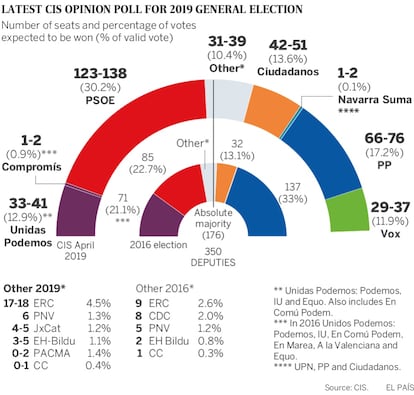New poll predicts Socialist Party victory at Spanish elections
The latest CIS survey predicts that current Prime Minister Pedro Sánchez will win the highest number of seats in Congress, but fall short of an absolute majority


The Socialist Party (PSOE) will win the upcoming general election in Spain with between 123 and 138 of the 350 seats in Congress, followed by the conservative Popular Party (66-76), Citizens (Ciudadanos, 42-51), Unidas Podemos and En Comú Podem (the former a coalition of the United Left party and Podemos, and the latter the Catalan formation of Podemos with other parties), and far-right group Vox (29-37). That’s according to the latest opinion poll carried out by Spain’s CIS public research institute, the results of which were made public on Tuesday.
The only guaranteed absolute majority would result from a deal between the PSOE and Ciudadanos
If these predictions turn out to be correct, the only guaranteed absolute majority would result from a deal between the PSOE and Ciudadanos – but the latter party has already categorically ruled out doing any kind of deal with the Socialists. But depending on the exact outcome of the election the PSOE could also form a government with the support of Podemos, the Basque Nationalist Party (PNV) and left-wing Valencian coalition group Compromís – without having to rely on Catalan nationalist parties for support.
The snap elections of April 28 were called earlier this year by Spanish Prime Minister Pedro Sánchez after his 2019 budget plan failed to find support in Congress. Sánchez has been in a delicate position since he came to power in June 2018 thanks to a successful motion of no confidence he filed against then-PP Prime Minister Mariano Rajoy over the corruption cases that had plagued the party for years. The PSOE currently enjoys just 85 seats in the 350-seat chamber, where 176 votes are needed for a majority, and has had to depend on cross-party support from groups including Catalan pro-independence parties to pass legislation.

This latest CIS poll has also revealed a large number of undecided voters ahead of the April polls. A total of 41.6% of those interviewed stated that they had not completely made up their mind yet as to who they will vote for – a record high.
In terms of the share of the vote, the CIS poll predicts that the PSOE will take 30.2% of the vote, and the PP with 17.2%. The latter party – which took 33% of the vote at the 2016 general elections – has shifted to the right since its new leader, Pablo Casado, took over, partly as a reaction to the growing support for far-right Vox, which garnered a shock result in the Andalusian regional elections late last year and proved to be kingmaker for a deal that saw the PP and Ciudadanos take power, throwing the PSOE out after 36 years of uninterrupted government.
Meanwhile, third place, according to the CIS, would be very tight, with Ciudadanos taking 13.6%, Unidas Podemos 12.9% and Vox 11.9%. By blocs, the left – the combination of PSOE, Podemos and its branches and Compromís – would beat out the center-right by two points.
If the poll is correct, Esquerra Republicana de Catalunya (ERC) – a pro-independence party known in English as the Republican Left of Catalonia – would see a significant increase in seats, jumping from its current nine to 14-15.
Conversely, the Catalan European Democratic Party (PDeCAT), which will be running at the upcoming elections under the name JxCat, would fall from its current eight deputies in Congress to 4-5.
Both ERC and PDeCAT were the driving force behind the 2017 pro-independence drive that saw an illegal referendum on secession held in October of that year, followed several weeks later by a unilateral declaration of independence. The leader of ERC, Oriol Junqueras, is currently being tried in the Supreme Court for his role in those events, while former PDeCAT leader and ex-regional premier Carles Puigdemont fled Spain to avoid arrest and continues to live in self-imposed exile in Belgium.
A total of 41.6% of those interviewed stated that they had not completely made up their mind yet as to who they will vote for
This latest CIS study was based on 16,194 personal interviews that were carried out between March 1 and 18. The number of respondents is much higher than usual – the February opinion poll, for example, used responses from 3,000 interviews. A survey of this scale normally has a cost of around €300,000.
According to the latest estimates carried out by EL PAÍS data expert Kiko Llaneras, who creates averages from the surveys published across different media outlets, the PSOE will win the elections with 28.5% of votes, followed by the PP with 20.3%, and then Ciudadanos (15.8%), Podemos (13.6%) and Vox (10.9%).
English version by Simon Hunter.
Tu suscripción se está usando en otro dispositivo
¿Quieres añadir otro usuario a tu suscripción?
Si continúas leyendo en este dispositivo, no se podrá leer en el otro.
FlechaTu suscripción se está usando en otro dispositivo y solo puedes acceder a EL PAÍS desde un dispositivo a la vez.
Si quieres compartir tu cuenta, cambia tu suscripción a la modalidad Premium, así podrás añadir otro usuario. Cada uno accederá con su propia cuenta de email, lo que os permitirá personalizar vuestra experiencia en EL PAÍS.
¿Tienes una suscripción de empresa? Accede aquí para contratar más cuentas.
En el caso de no saber quién está usando tu cuenta, te recomendamos cambiar tu contraseña aquí.
Si decides continuar compartiendo tu cuenta, este mensaje se mostrará en tu dispositivo y en el de la otra persona que está usando tu cuenta de forma indefinida, afectando a tu experiencia de lectura. Puedes consultar aquí los términos y condiciones de la suscripción digital.








































